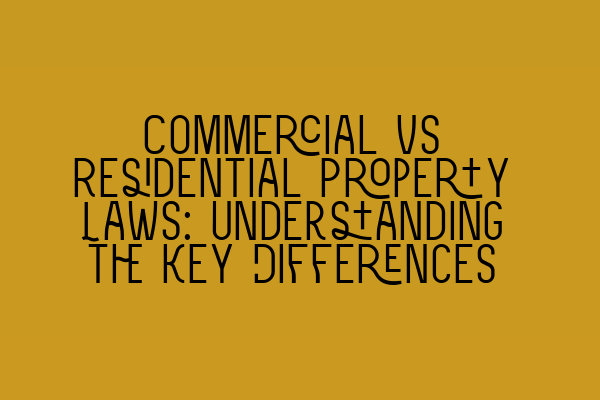Commercial vs Residential Property Laws: Understanding the Key Differences
As a solicitor specializing in property law, it is essential to have a thorough understanding of both commercial and residential property laws. While they may seem similar on the surface, there are key differences between the two that can significantly impact legal proceedings and the rights of parties involved. In this blog post, we will explore the contrasts between commercial and residential property laws and why it is crucial for legal professionals to have a comprehensive understanding of these differences.
Distinguishing Between Commercial and Residential Property
Before delving into the legal disparities, it is important to establish a clear distinction between commercial and residential properties. Commercial properties are generally utilized for business purposes, such as offices, retail stores, warehouses, and industrial units. On the other hand, residential properties are primarily dedicated to housing individuals and families, including apartments, houses, and condominiums.
Lease Agreement Variances
One of the prominent disparities between commercial and residential property laws revolves around lease agreements. Commercial lease agreements are often more complex and customizable than residential leases. They typically involve negotiating terms regarding rent increases, maintenance responsibilities, insurance coverage, and lease duration. Additionally, commercial leases may include provisions for subletting or assigning the lease to another party.
On the other hand, residential lease agreements are generally governed by statutory frameworks that aim to protect the rights of tenants. These frameworks often restrict the landlord’s ability to modify the terms of the lease and provide more explicit guidelines on rent increases, eviction procedures, and habitability standards. These legal protections are in place to ensure that tenants have a safe and secure living environment.
Legal Remedies in Property Disputes
Legal remedies for property disputes can also vary significantly between commercial and residential properties. Commercial property disputes are typically resolved through litigation, arbitration, or alternative dispute resolution methods. The primary focus of these proceedings is often on protecting the interests of businesses and ensuring the smooth operation of commercial activities.
On the other hand, residential property disputes often involve tenancy issues and are generally resolved through specialized housing courts or tribunals. These bodies aim to protect the rights of tenants, resolve conflicts, and prevent unfair eviction practices. The legal remedies available for residential property disputes may include compensation for damages, order for repairs, or termination of the tenancy agreement.
Property Financing and Taxation
The financing and taxation aspects of commercial and residential properties also have distinctive characteristics. Commercial property financing often involves more complex arrangements, such as commercial mortgages, loans, and commercial property investment vehicles. Due to the higher risks associated with commercial properties, lenders may require more extensive due diligence and higher down payments.
Residential property financing, on the other hand, is typically more accessible to individuals and families. Residential mortgages are widely available, and there are various government schemes and assistance programs aimed at helping first-time buyers. Additionally, residential property transactions may be subject to different tax rules, such as stamp duty land tax, which can vary depending on the property value and the buyer’s status.
Conclusion
In conclusion, understanding the key differences between commercial and residential property laws is of utmost importance for solicitors specializing in property law. The variations in lease agreements, legal remedies in property disputes, property financing, and taxation can significantly impact how these properties are regulated and managed. With a thorough understanding of these disparities, legal professionals can provide effective and tailored advice to their clients.
If you are preparing for the SQE exams or looking for practice materials, we recommend checking out our related articles:
– SQE 1 Practice Exam Questions: Click here
– SQE 1 Practice Mocks FLK1 FLK2: Click here
– SQE 2 Preparation Courses: Click here
– SQE 1 Preparation Courses: Click here
– SRA SQE Exam Dates: Click here
These resources will provide you with valuable exam preparation materials and guidance to help you succeed in your legal career.
